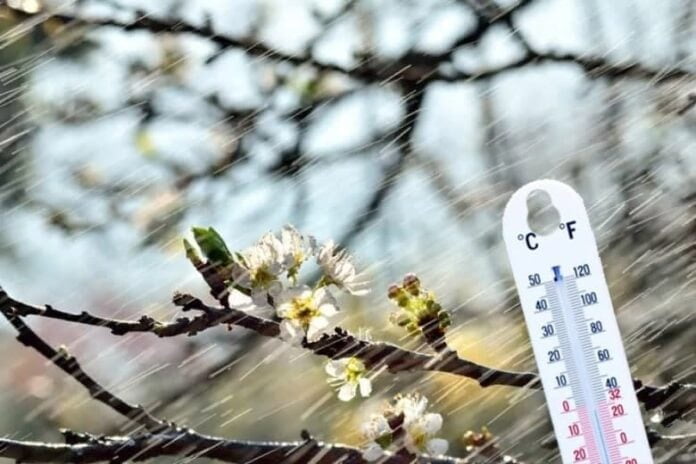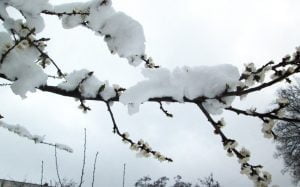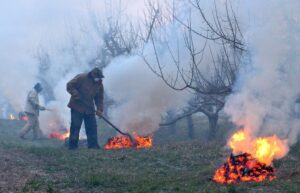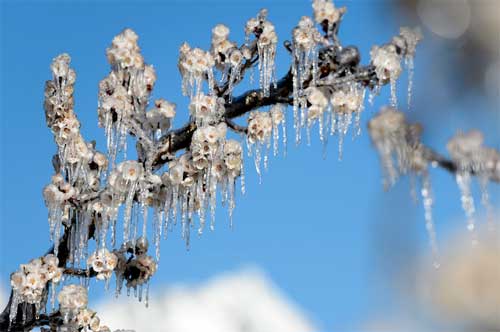Due to prolonged rainfall in the first half of March 2022 and the subsequent cooling in the second half of March in Uzbekistan, fruit growers fear the deterioration of fruit trees, and vegetable growers are worried about the harvest of early potatoes and early vegetables, EastFruit experts report.
March 2022 was abnormally rainy in Uzbekistan – unprecedented in terms of intensity and duration of rains. According to the Center for hydrometeorological services of Uzbekistan, there have been almost 2 monthly rainfall in the capital of Uzbekistan from 5 to 17 March, in mountainous and foothill areas – 2-3 times more rains than usual. During this period, it had been raining almost daily with short breaks.
But the weather surprises in Uzbekistan did not end there, as the rainy weather gave way to a cold snap anomalous for this time of year. On March 16, 2022, the Center for hydrometeorological services of Uzbekistan forecasted a sharp decrease in air temperature on 18-21 March throughout the country. In particular, in Tashkent, Samarkand, Jizzakh and Syrdarya regions, the temperature was expected to drop to 2°C during the day, and to -2°C at night. In Bukhara and Navoi regions – up to -6°C at night. In Karakalpakstan and Khorezm region it was expected that the night temperature would drop to -10°C. In the foothills and mountainous regions of the country, the air temperature at night was expected to drop to -7°C.

According to the State Committee on Statistics, the total share of the above regions in the total fruit and berry production of Uzbekistan in 2021 amounted to about 40%, and in the total vegetable production – a little more than 50%.

Representatives of the Ministry of Agriculture of Uzbekistan noted that a cold snap after prolonged rains could damage, first of all, the harvest of early-flowering stone fruits – almonds and apricots. In addition, it can affect the yield of peaches, plums, cherries, sour cherries, walnuts and late-flowering apples and pears.
Meanwhile, no negative impact of weather surprises on the harvest of fruits and nuts is expected in the northern regions of the country due to later flowering there – 15-20 days later.
At the briefing, a representative of the ministry spoke in detail about agrotechnical measures to protect fruit and nut orchards from upcoming frosts. To support agricultural producers, the Ministry of Agriculture has established operational groups and regional headquarters in each region of Uzbekistan.
Recently, the TV channel “Uzbekistan 24” showed a video about how growers of the Kibray district of the Tashkent region save blossoming fruit trees from frost by “heating” them. Dense smoke and small bonfires allow to raise the temperature by several degrees of heat: bonfires are lit in a checkerboard pattern throughout the orchard and trees are wrapped in smoke, taking into account the direction of the wind, they increase smoke or leave it smoldering.
In addition, these frosts also pose a threat to the harvest of early potatoes and early vegetables. The Ministry of Agriculture of Uzbekistan has issued a series of recommendations to prevent the negative impact of cold and wet spring weather on the early harvest of potatoes and vegetables.

According to the forecast by the Center for hydrometeorological services of Uzbekistan, there will be no intense and prolonged rains in the remaining days of March.
According to climate scientists, global warming leads to an increase in the extremeness of weather events, including an increase in the frequency of abnormally dry or abnormally wet periods. March 2022 in Uzbekistan is a vivid confirmation of this.
Weather anomalies in the winter months and early spring of 2021 became the number one topic that affected all other aspects of the work of vegetable, fruit and nut producers in Uzbekistan, those involved in the trade and processing of fruits and vegetables and, of course, consumers.
The use of the site materials is free if there is a direct and open for search engines hyperlink to a specific publication of the East-Fruit.com website.




